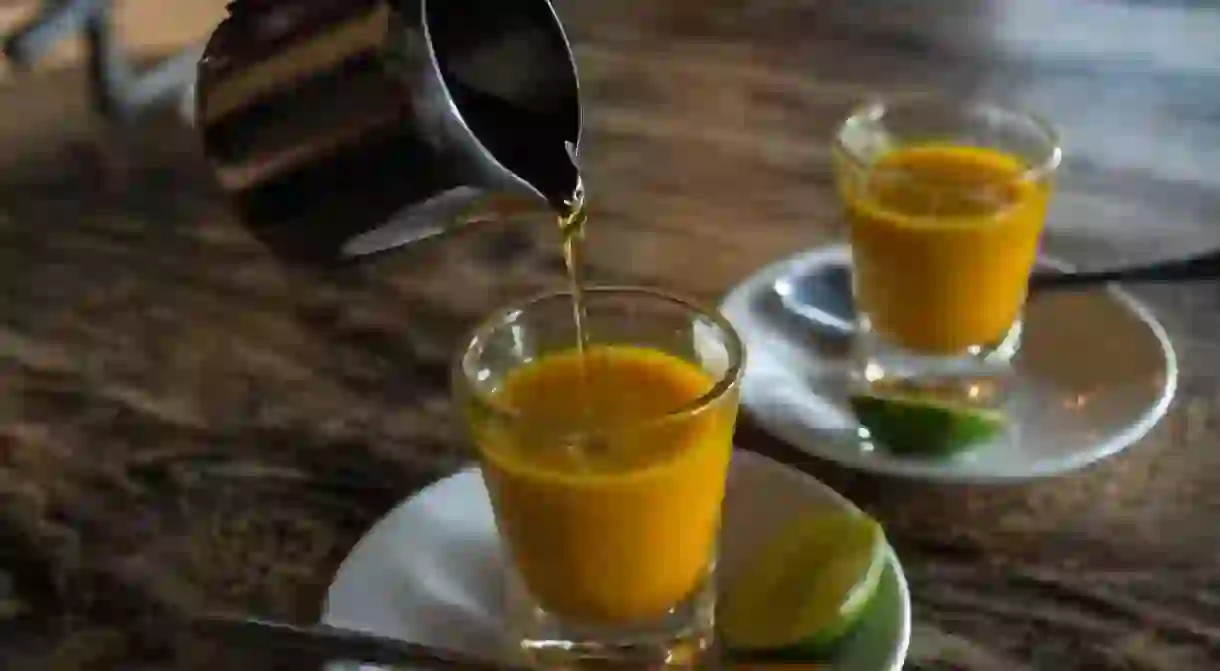10 Traditional Indonesian Medicine Recipes With Real Health Benefits

Long before modern Western medicine was introduced, Indonesians managed to combat many illnesses with traditional medicinal recipes. Even now, many households still prefer these ancient recipes over modern medicines, while companies incorporate this old wisdom into today’s products. From fever cures to weight-loss potions, discover Indonesia’s incredible traditional medicinal recipes.
Turmeric-Tamarind herbal
Often found in Asian cooking recipes, turmeric is also cherished for its anti-inflammatory and antioxidant properties. Combined with tamarind, the turmeric acid herbal is a proven remedy for menstrual pain, inflammation, high blood pressure, and more. Many also count on this herbal to lose weight. To make this beverage, brew shredded or powdered turmeric and tamarind in the same amount, add palm sugar and a little salt to taste.
Temulawak
Temulawak, or Java ginger, is a spice plant native to Indonesia and for centuries it has been observed to yield several health benefits. Temulawak drinks have been used to relieve nausea, dizziness, and symptoms of cold. But perhaps the most common use for this herb is to improve appetite, especially for children. To make a temulawak potion, mash temulawak and brew with tamarind and palm sugar, keep it boiling until only half the water remains.

Rice-Kencur herbal
This herbal remains one of Indonesia’s favorite not only for the health benefits, but also for the fresh and delicious taste. Kencur, also known as aromatic ginger or sand ginger, is rich in zinc and other minerals, making it a common ingredient for various traditional cooking and medicinal recipes throughout Asia. Combined with rice and other spices, the herbal drink helps with cholesterol, inflammation, and overall immune system. To make the rice and kecur herbal, first you’ll have to prepare the rice grains by soaking them for three hours. Brew kencur with a little turmeric, tamarind, ginger, and palm sugar. After the water boils, take all the ingredients and mash them together, then brew once more.

Javanese chili herbal
This herbal uses Piper retrofractum, also known as puyang chili, Javanese chili, Javanese long pepper, or Balinese long pepper. Often used as spice and seasoning in traditional meals, this herb is also effective to treat soreness or stiffness in the body. The abundance of iron and other nutritions also help the body to produce more red blood cells and prevent anemia. To make this herbal drink, you can mash or chop the chili, or dry it before, then boil with water. Add honey or palm sugar to taste according to your preference.
Pahitan
Pahitan is derived from the word ’pahit’ that means bitter. Basically an assortment of bitter things, this herbal drink incorporates various leaves, mainly sambiloto, but also brotowali, meniran, lempuyang, and others in smaller measure. This traditional medicine is predictably notorious for its unpleasant taste, but its efficacy has stood the test of time in helping with high blood sugar, cholesterol, and the digestive system. It also helps with smaller discomfort like open wounds, fever, stiffness, and headache.

Kumis kucing
Orthosiphon aristatus, or cat’s whiskers or Java tea, is a tropical medicinal herb that is often used in medicine recipes, both traditional and modern. Its popularity is partly due to the immense availability and low maintenance, so anyone can grow these in their own backyard, but also for the rich nutrients. There are different recipes for different symptoms that this plant can help treat. But for the most part, brewing the plant is enough to make a traditional medicine that helps with diabetes, high blood pressure, fever, even STDs. Kumis kucing drink is also safe to consume every day until the symptoms are relieved.

Uyup-uyup
This herbal drink is especially popular among breastfeeding mothers, as the nutrients inside are proven to help increase milk production and its quality, among other benefits such as eliminating bad body odour and relieving digestive problems. Uyup-uyup, or gepyokan, uses kencur, ginger, galingale, temulawak, puyang, and kunir; chopped then mashed, and then brewed together. You can also add sugar to help with the taste.
Sarabba
In South Sulawesi, where this drink originated, locals enjoy this beverage daily, and during special occasions as well. This recipe includes a number of spices, making sarabba ideal to help keep the body warm during cold weather. More than the tasty flavor and warming properties, sarabba is also known to have helped with flu and improve stamina and body immunity. To make a spicy, delicious glass of sarabba, boil water with chops of ginger, lemongrass, and cinnamon. Then add palm sugar and pepper, then coconut milk. Continue boiling for another 10 minutes. At the last minute, add egg yolk on top. Serve directly.

Kudu-Laos herbal
Two main ingredients for this herbal drink are laos (galangal) and mengkudu (Morinda citrifolia or cheese fruit). Other than the pleasantly warming effect to the body, this traditional herbal drink also helps relieve various stomach discomforts including menstrual cramps. Kudu-Laos is good for both children and adults. If consumed regularly, it can also help with hypertension and improving appetite. To make this recipe, mince laos and mengkudu then brew them together. You can also add other ingredients such as tamarind, garlic, puyang chili, salt, and pepper according to taste.

Jamu Galian singset
This herbal drink has one of the most coveted words in its name: ‘singset’ means slim or lean. And that effect is what makes this traditional recipe so popular, especially among women. But more than that, many people swear by other benefits like better skin, aromatic body scent, and more toned female organs. This recipe uses temulawak, ginger, turmeric, lemongrass, and cinnamon, mixed with tamarind, coriander, and pepper, all mashed together and boiled.













